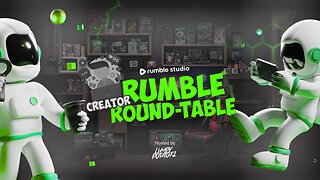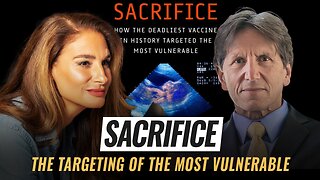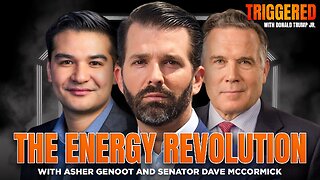Premium Only Content

Robert F. Kennedy Jr.: "When FDA approves a ...
Robert F. Kennedy Jr.: "When FDA approves a food or a drug, there's panels that do that. There are outside panels. They're not FDA employees. The same with CDC when it recommends vaccines. It has a panel that it assembles of so-called experts. As it turns out, the experts on those committees, almost all of them have conflicts of interest so that they're making money from the companies whose products they're approving."
"And we're going to end that when we get into office. They're making money, for example, and Calley can talk about, specifically about the individuals who are on the FDA committee that approves new foods and the USDA committee that creates the food pyramid. Those are people from the food industries and they're professors who are developing products and chemicals that they will profit from by selling them to the food industry."
"There's another conflict. NIH, when I was a kid, was 15 minutes from my home, and I wanted to be a scientist when I grew up. And I would go to NIH and look through the microscopes. I had a friend who was a scientist there, and I loved going to NIH, and it was, like I said, the gold standard medical or scientific research, biomedical research agency on Earth."
"In 1980, Congress passed a law, and Ronald Reagan signed it, called the Bayh-Dole Act. And that act said that scientists who worked for NIH, who developed new drugs, would keep royalties from those drugs if those drugs made it to the market. Plus, NIH itself could keep up to 50% of the royalties on drugs that it developed. It quickly became the primary preoccupation of NIH."
"So it stopped doing the kind of medical research designed to make us better. And it focused instead on the research to develop new drugs that would bring money into the agency. And I'm not sure of this data, and I don't use data usually that I'm completely unsure, but I think it was 2016. There were 220 new drugs approved by FDA, and every one of them came out of NIH."
"NIH has become the incubator for new pharmaceutical products. And I'll give you an example. The Moderna vaccine, which was pushed heavily by the government, and we were mandated to take that or one of the other products, but depending on a region, that may have been your only choice. That product was developed in-house at NIH. There are six scientists at NIH who will collect $150,000 forever, not just for their lives, but as long as mRNA products are on the market, they and their heirs will collect money."
"So they're paying for their mortgages, their boats. They're paying for their children's education. They're paying their alimony payments based upon if that drug sells in the marketplace. Plus, NIH itself owns 50 percent of the Moderna vaccine, so it will collect tens of billions of dollars from sales of that vaccine. So these are the regulators that we pay through taxpayer money to find problems with those products, to make sure that they're safe."
"But of course, if you're paying all of your bills with that product, you have a huge incentive to overlook those problems. And that mercantile impulse in any system will quickly overcome and subsume the regulatory function. I'm sorry, that's just a conflict of interest."
-
 2:11:56
2:11:56
megimu32
8 hours agoOTS: With Great Power: Every Spider-Man Movie Unmasked w/ @thisistheraygaming
42.9K4 -
 2:38:48
2:38:48
WickedVirtue
7 hours agoSailing w/ The Crew
43.8K1 -
 4:29:37
4:29:37
Meisters of Madness
10 hours agoThe Finals with Redd
46.7K1 -
 1:27:11
1:27:11
Omar Elattar
15 hours agoThe Dating Expert: "I've Helped 4,000 Men Find LOVE!" - The #1 Alpha Trait Women Secretly Crave!
60.9K1 -
 6:04:59
6:04:59
VOPUSARADIO
15 hours agoPOLITI-SHOCK! "END THE FED, END THE LIES & END THE DEEP STATE ONCE AND FOR ALL"!
40.4K1 -
 1:43:38
1:43:38
LumpyPotatoX2
10 hours agoRumble Creator Round-Table - Let's Talk About It
38.9K2 -
 32:38
32:38
The Mel K Show
13 hours agoMel K & Dr. James Thorp, MD | Sacrifice: The Targeting of the Most Vulnerable | 7-24-25
41K14 -
 1:12:41
1:12:41
Donald Trump Jr.
12 hours agoFrom Crypto to AI, There's a New American Energy Revival, Interviews with Asher Genoot & Sen McCormick | TRIGGERED Ep.261
169K62 -
 52:11
52:11
ZeeeMedia
15 hours ago"Meaningful Deep State Prosecution" ft. Robert Barnes | Daily Pulse Ep. 73
47.3K14 -
 8:10
8:10
MattMorseTV
13 hours ago $4.67 earnedThey just CAVED.
35.6K32